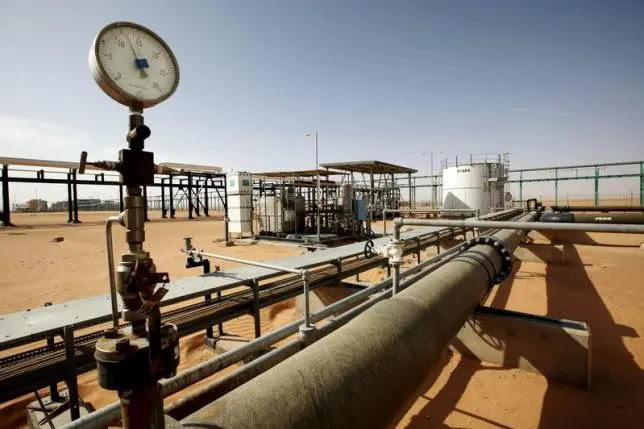PHOTO
TUNIS - Libya's Waha Oil Co is producing about 260,000 barrels per day (bpd), up more than 100,000 bpd from the company's output levels this summer, but further gains are complicated by a lack of investment, its chairman said on Tuesday.
Ahmed Ammar said Waha was aiming to increase output to 375,000 bpd by the end of next year but was facing major funding shortfalls and challenges in maintaining damaged infrastructure.
Waha is a subsidiary of Libya's National Oil Corporation (NOC) and operates as a joint venture with Hess Corp, Marathon Oil Corp and ConocoPhillips.
Its oil is exported through Es Sider terminal, which reopened late last year after an armed group that was blockading the port was forced out.
Waha's gains have helped raise Libya's national oil output to around one million bpd, about four times higher than the OPEC member's production in mid-2016.
It remains well below the 1.6 million bpd Libya was producing before a 2011 uprising, and vulnerable to continuing political and economic turmoil.
Plans to increase Waha's production to as high as 600,000 bpd over the next five years, partly through major new projects at the NC-98 and Jalo North fields, have been postponed because of a lack of funding, Ammar told Reuters on the sidelines of a business conference in Tunis.
But he said some gains could be made by developing drilling in fields that are already in production and replacing pumps that were damaged after long output stoppages.
"Some of the production will come from existing wells. We need to work them over," Ammar said.
Some of Waha's fields and facilities have been badly damaged in militant attacks, fighting and looting.
At Es Sider, 12 out of 19 storage tanks remain out of use. Ammar said this was not hampering exports, but would become a constraint if the company raised its production towards 400,000 bpd.
Waha hopes to rebuild two of the storage tanks next year, adding storage capacity of one million barrels, but Ammar said approval for the project from Libya's Audit Bureau was still pending.
Waha has also suffered repeated leaks in its pipeline network, which was damaged by highly corrosive water. In one pipeline there were 57 leaks in a single month, Ammar said.
The company has been patching up or clamping pipes but needs to replace or upgrade sections of its network, which is much more expensive.
"Our major issue now at Waha in the existing facilities is the pipelines," Ammar said. "They require a lot of funding."
(editing by David Evans and Adrian Croft) ((Aidan.Lewis@thomsonreuters.com ; +216-29850352;))
Ahmed Ammar said Waha was aiming to increase output to 375,000 bpd by the end of next year but was facing major funding shortfalls and challenges in maintaining damaged infrastructure.
Waha is a subsidiary of Libya's National Oil Corporation (NOC) and operates as a joint venture with Hess Corp, Marathon Oil Corp and ConocoPhillips.
Its oil is exported through Es Sider terminal, which reopened late last year after an armed group that was blockading the port was forced out.
Waha's gains have helped raise Libya's national oil output to around one million bpd, about four times higher than the OPEC member's production in mid-2016.
It remains well below the 1.6 million bpd Libya was producing before a 2011 uprising, and vulnerable to continuing political and economic turmoil.
Plans to increase Waha's production to as high as 600,000 bpd over the next five years, partly through major new projects at the NC-98 and Jalo North fields, have been postponed because of a lack of funding, Ammar told Reuters on the sidelines of a business conference in Tunis.
But he said some gains could be made by developing drilling in fields that are already in production and replacing pumps that were damaged after long output stoppages.
"Some of the production will come from existing wells. We need to work them over," Ammar said.
Some of Waha's fields and facilities have been badly damaged in militant attacks, fighting and looting.
At Es Sider, 12 out of 19 storage tanks remain out of use. Ammar said this was not hampering exports, but would become a constraint if the company raised its production towards 400,000 bpd.
Waha hopes to rebuild two of the storage tanks next year, adding storage capacity of one million barrels, but Ammar said approval for the project from Libya's Audit Bureau was still pending.
Waha has also suffered repeated leaks in its pipeline network, which was damaged by highly corrosive water. In one pipeline there were 57 leaks in a single month, Ammar said.
The company has been patching up or clamping pipes but needs to replace or upgrade sections of its network, which is much more expensive.
"Our major issue now at Waha in the existing facilities is the pipelines," Ammar said. "They require a lot of funding."
(editing by David Evans and Adrian Croft) ((Aidan.Lewis@thomsonreuters.com ; +216-29850352;))





















